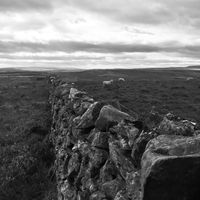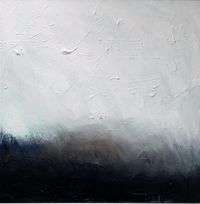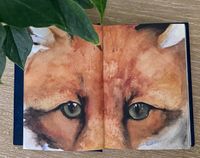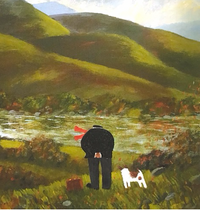"Poetry is not made out of thoughts or casual fancies. It is made out of experiences which change our bodies, and spirits, whether momentarily or for good."
"Poetry is not made out of thoughts or casual fancies," the formidable poet Ted Hughes instructs in his writing handbook, Poetry in the Making: Handbook for Writers and Teachers. "It is made of experiences which change our bodies and spirits." We shall be moved, affected, and inhabited before the poem has taken root, even before the seed warms and opens. Keats once said poetry arises like a tree bearing leaves from such loam. As an exhale of self into the world and each other.
Ted Hughes (August 17, 1930 – October 28, 1998) was born and raised in Yorkshire, a place studded with a brutal and sublime atmosphere that inhabits his work.
I'll never forget these lines from Hughes' first collection, published in 1957:
I drown in the drumming ploughland,
I drag heel after heel from the swallowing of the earth's mouth.
From "Hawk in the Rain"
There is something primal, pulling a heel from the chalky muck from whence we were formed, not in adventure but in quotidian doing. It could be a walk from one farmhouse to the next. How do such experiences create the writer's self?
While living in the Pennines of West Yorkshire, Hughes remembered gales that shook the house and left the field grass: "A particularly brilliant watered green, and the stone walls of the enclosures that cover the hillsides like a great net thrown over whales, coal black."
 Yorkshire.
Yorkshire. Poetry is not made out of thoughts or casual fancies. It is made out of experiences that change our bodies and spirits, whether momentarily or for good. There are plenty of different experiences which do this, and there is no drawing a line at what the limit is.
But the experiences need not be treacherous or tumultuous. They merely need to be something we experience and feel and might want to convey beyond immediate words.
 "Open Space" oil on canvas by Clare Millen, a Cambridgeshire artist who uses a process of repeated application and scraping to form landscape-suggestive structures on the canvas.
"Open Space" oil on canvas by Clare Millen, a Cambridgeshire artist who uses a process of repeated application and scraping to form landscape-suggestive structures on the canvas.The most intimate memory and experience that drove Hughes to poetry when he was fifteen was his love of capturing animals. He drew from a childhood spent capturing animals to render those animals and their feelings on the page.
It was years before I wrote what you could call an animal poem and several more years before it occurred to me that my writing poems might be partly a continuation of my earlier pursuit. Now I have no doubt. The special kind of excitement, the slightly mesmerized and entirely involuntary concentration with which you make out the stirrings of a new poem in your mind, then the outline, the mass and colour and clean final form of it, the unique living reality of it amid the general lifelessness, all that is too familiar to mistake. This is hunting, and the poem is a new species of creature, a unique specimen of life outside your own.
 An unblinking foe or friend? From the magical pen tip of Jackie Morris, an artist and writer of dueling observation and imagination.
An unblinking foe or friend? From the magical pen tip of Jackie Morris, an artist and writer of dueling observation and imagination.Hughes' first animal poem was about an animal he attempted to capture and keep alive but was never able to. In many ways, it haunted him. Years later, during a late snowy night in London, Hughes wrote "The Thought-Fox."
I imagine the midnight moment's forest:
Something else is alive
Besides the clock's loneliness
And the blank page where my fingers move, Through the window I see no star:
Something more near
Through deeper within darkness
Is entering the loneliness:[...]
Across the clearings, an eye,
A widening deepening greenness
Brilliantly, concentratedly,
Coming about its own business Till, with a sudden sharp hot stink of fox
It enters the dark hole of the head.
The window is starless still: the clock ticks,
The page is printed.
From "The Thought-Fox"
The poem is not about an animal; it is about the feelings of an animal, the spirit of an animal. Hughes explains:
The poem does not have anything you could easily call a meaning. It is about a fox, obviously enough, but a fox that is both a fox and not a fox. What sort of fox is it that can step right into my heart where presumable it still sits, smiling to itself when the dog bark. It is both a fox and a spirit... It is genuine to me. The words have made a body for it and given it somewhere to walk.
Like David Attenborough, born three years before Hughes in Leicester, or naturalist Gerald Durrell two years before that - a youth surrounded by the eager come-hitherness of nature affected their lives, the gentle stewardship of "capturing beast" moved Hughes the most. Helen Macdonald summons the same sort of reverent awe and hardly-contained grace in her taming of a goshawk.
 "Why is it I keep failing? I don't know what to do. Perhaps it's time to head back south." Illustration and words by Gary Bunt from his gentle guide to finding the unknowable: The Man Who Found God.
"Why is it I keep failing? I don't know what to do. Perhaps it's time to head back south." Illustration and words by Gary Bunt from his gentle guide to finding the unknowable: The Man Who Found God.Hughes’s love of animals was not only a catalyst of his poetry, but it was also the subject matter of some of his best poems, reaching its apotheosis in Crow: Songs of the Crow. This dark, annihilating poem introduces a crow as a metaphor for a complex self.
I think of poems as a sort of animal. They have their own life, like animals, by which I mean that they seem entirely separate from any person, even from their author, and nothing can be added to them or taken away from without maiming and perhaps even killing them. And they have a certain wisdom. They know something special... something maybe which we are curious to learn.
A love of animals undoubtedly promotes excellent writing (see Edward Gorey's feline-inspired adoration or Mary Oliver's canine-inspired love poems). But really, we should seek a universality of existence in the most mundane things. And an unfettered desire to express that universality.
Poetry in the Making: A Handbook for Writing and Teaching was originally a collection of lectures Hughes gave to the BBC. This series aimed the bright light of consciousness to children eager to learn and express themselves. Poems are formed from things that create us, render us our landscape of sorts, and cannot be explained without examination of such terrain.
Read more on the poetic landscape from American poet Richard Hugo's connection of poetry to the places of our past and Gaston Bachelard's philosophical concept of poetry as rooting the abstract in the accessible and perhaps round it off with Mark Strand on poet and the poem clasped together in reciprocal formation.

